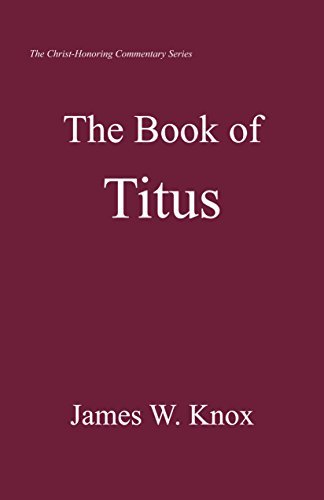TL;DR
The Book of Titus by James W. Knox provides a straightforward analysis of Paul's letter to Titus, addressing church life, personal holiness, and the transformative power of the gospel amidst cultural challenges.
What is The Book of Titus about
The Book of Titus is the fourth volume in The Christ-Honoring Commentary Series and focuses on the Apostle Paul’s instructions to Titus. Written in a no-nonsense style, Knox examines the implications of the gospel message for personal conduct and church governance. The book underscores how Christian beliefs should inform every aspect of life, particularly when living in a culture that contrasts sharply with biblical teachings. Knox aims to provide clarity on doctrinal matters while addressing practical issues that arise within the church community, making the content accessible and applicable for both leaders and laypersons alike. By tackling difficult questions and confronting critics of biblical doctrine, the author seeks to encourage readers to uphold the gospel's transformative power.
The Book of Titus 5 Key Takeaways
The Importance of Doctrine
Knox emphasizes that sound doctrine is pivotal for a robust Christian life. The beliefs one holds about God directly influence their actions and decisions, making it essential to engage deeply with biblical truths.
Cultural Transformation
The book illustrates how the gospel can reshape cultures from within, particularly in challenging environments like Crete. Titus is instructed to lead by example, showing how grace can lead to significant personal and communal change.
Personal Holiness
A recurring theme in Knox's commentary is the call to personal holiness. He stresses that believers should reflect the transformative grace of Christ in their lives, which involves rejecting sin and living righteously.
Church Governance
Knox provides insights into the governance of the local church, highlighting the qualifications for church leaders and the importance of accountability in ministry. This structure aims to promote a healthy church environment.
Addressing Criticism
The author does not shy away from addressing critiques of biblical teaching. He argues for a literal interpretation of the Scripture, presenting counterarguments to self-righteous critics who misinterpret or misuse biblical principles.
The Book of Titus Videos
Book of Titus Summary: A Complete Animated Overview - YouTube
Top The Book of Titus Quotes
- "Sound doctrine produces godly living; a church grounded in truth will flourish in grace."
- "Through the gospel, we are not merely saved from sin; we are transformed to reflect Christ's character in a broken world."
- "Leadership in the church is not merely a title; it is a calling to embody the gospel in every aspect of ministry."
Who should read The Book of Titus?
This book is ideal for pastors, church leaders, and laypeople who are seeking to deepen their understanding of biblical principles as they apply to church life and personal conduct. Readers will find practical insights that can inspire them to live out their faith authentically and lead others with integrity.
The Book of Titus Best Reviews
- "James W. Knox offers a refreshing and rigorous exploration of the Book of Titus, making complex theological concepts accessible to all readers."
- "This commentary stands out for its straightforward approach and practical applications, making it an invaluable resource for church leaders and laypeople alike."
- "Knox’s ability to tackle difficult issues head-on while remaining deeply rooted in Scripture is both commendable and necessary in today’s church context."
People also liked these summaries
The Book of Titus FAQs
What is the main theme of The Book of Titus?
The main theme centers around the transformative power of the gospel, emphasizing that sound doctrine and a commitment to personal holiness are essential for effective church life.
How does Knox address cultural challenges in the book?
Knox discusses how believers can live out their faith in a sinful culture by embodying the teachings of the gospel, illustrating that transformation begins at an individual level.
Who can benefit from reading this book?
Pastors, church leaders, and anyone interested in understanding the practical implications of biblical doctrine will find valuable insights and guidance in this commentary.
